Home | Class News | 50th Reunion | Past Reunions | Other Gatherings | Newsletter Archive | Links | Memorials | Classmates Search | Classmates Found | Former Faculty | Contacts |
![]()
Remembering Ron Emery
Ned Groth, September, 2011
(Author’s note: This biographical remembrance is based on documents and personal communications, including yearbooks, class newsletters, letters Ron wrote to me, conversations we had, published accounts in the Peg Board and other media, and my own recollections. I have woven in a few anecdotes from other classmates, former faculty, and Ron’s friends, with special thanks to Larry Dudley and Laurel Trahan. My goal has been to create an honest and loving portrait of our former master, as we knew him. While I’ve striven for factual accuracy, I take full responsibility for any errors. This remembrance can be amended, if need to be, as others contribute their own memories to it. –NG)
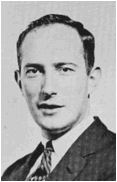 Ron Emery joined the Darrow faculty during the summer of 1959, and taught sophomore English. He was just three years out of Williams, a music major with a minor in English. As this yearbook photo suggests, Ron, like the rest of us, was impossibly young, back then. He had been teaching English at Robert College in Istanbul, Turkey, met Richard Bethards there, and when Richard returned to Darrow that summer, somehow a position opened for Ron, too. Mr. Heyniger had a tendency to hire brilliant, often somewhat eccentric individuals who had the potential to be inspiring teachers, and Ron fit that bill. Those of us who had expected to have Dick Nunley for sophomore English (he’d taught it the year before) quickly adjusted to having Ron instead. He was an entertaining and demanding teacher, although as we’d learn the next year, he was an easy grader compared to Richard. Ron taught us to diagram sentences, drilled us on grammar, spelling and punctuation, guided us through classics like “For Esmé With Love and Squalor” and several of Shakespeare’s plays (much as Richard got in touch with his inner Lady Macbeth, Ron seemed to channel Falstaff), amused us with exercises drawn from the life of Tandeleo Phaphufnik and other outrageously named fictional characters of his imagination. We learned a lot of English and generally enjoyed the experience.
Ron Emery joined the Darrow faculty during the summer of 1959, and taught sophomore English. He was just three years out of Williams, a music major with a minor in English. As this yearbook photo suggests, Ron, like the rest of us, was impossibly young, back then. He had been teaching English at Robert College in Istanbul, Turkey, met Richard Bethards there, and when Richard returned to Darrow that summer, somehow a position opened for Ron, too. Mr. Heyniger had a tendency to hire brilliant, often somewhat eccentric individuals who had the potential to be inspiring teachers, and Ron fit that bill. Those of us who had expected to have Dick Nunley for sophomore English (he’d taught it the year before) quickly adjusted to having Ron instead. He was an entertaining and demanding teacher, although as we’d learn the next year, he was an easy grader compared to Richard. Ron taught us to diagram sentences, drilled us on grammar, spelling and punctuation, guided us through classics like “For Esmé With Love and Squalor” and several of Shakespeare’s plays (much as Richard got in touch with his inner Lady Macbeth, Ron seemed to channel Falstaff), amused us with exercises drawn from the life of Tandeleo Phaphufnik and other outrageously named fictional characters of his imagination. We learned a lot of English and generally enjoyed the experience.
Ron had had polio as a child, and he walked with pronounced limp, one foot splayed out. In typical thoughtlessly cruel adolescent fashion, some students nicknamed him “The Duck,” and boys occasionally would quack behind his back. He didn’t coach any sports; he did play the piano rather well. His real forte, it later developed, was coaching drama, but during our years there, Richard held down that role, while Ron waited in the wings.
Ron was the assistant housemaster in Hinckley (Richard was the housemaster), and he was my dorm master for three years. Junior year, I roomed with Joe Coffee, Frank Rosenberg and Roland Wright in a room directly above Ron’s apartment. We would get rowdy, probably pretty often, and Ron would open his door and yell up the stairs for us to knock it off (we came to count on the fact that he wouldn’t come running up the stairs to yell at us directly); two or three threats from the bottom of the steps usually worked. At one point, for reasons lost to memory, I was in a pissy mood and I quacked at him, said “Oh Shut Up!” in my best Donald Duck imitation. I didn’t think he could see who it was, so I felt safe. Little coward that I was. A week or so later, I ran into Ron walking across campus and he burst into a big smile and said. “Hello, Embryo!,” using the nickname bestowed on me by Chip Detwiller, which I despised. My face must have shown how shocked and hurt I was, and Ron said, “Doesn’t feel very good, does it?” and walked on by. More than a year later, Ron wrote in my senior yearbook, “If you’ll forget my nickname, I’ll forget yours—a deal?”
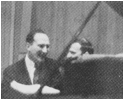 Ron dealt more deftly with another trauma that was part of Darrow life in those days. Peter Golden, who had personally been a target of the nasty anti-Semitism practiced by some of the Ann Lee boys (and who has told me he had never experienced ethnic hatred before he came to Darrow that fall), wrote an “impassioned” (as he later put it) theme about anti-Semitism for Ron’s class. Peter told me that Ron called his mother, and they had a long conversation about what Peter was going through. And, a week or two later, at the pre-Hands-to-Work gathering in the parking lot, The Boss made a little speech about prejudice and discrimination, how corrosive and harmful they were, how they had no place at Darrow. Years later, Peter connected the dots, figured that Ron probably took the issue up with Mr. Heyniger, as well.
Ron dealt more deftly with another trauma that was part of Darrow life in those days. Peter Golden, who had personally been a target of the nasty anti-Semitism practiced by some of the Ann Lee boys (and who has told me he had never experienced ethnic hatred before he came to Darrow that fall), wrote an “impassioned” (as he later put it) theme about anti-Semitism for Ron’s class. Peter told me that Ron called his mother, and they had a long conversation about what Peter was going through. And, a week or two later, at the pre-Hands-to-Work gathering in the parking lot, The Boss made a little speech about prejudice and discrimination, how corrosive and harmful they were, how they had no place at Darrow. Years later, Peter connected the dots, figured that Ron probably took the issue up with Mr. Heyniger, as well.
When spring of 1962 rolled around, and the Class of ’62 departed, most of us with diploma in hand, Ron stayed on. Two twists of fate helped shape the rest of his Darrow career. First, Richard Bethards departed when we did, leaving the Drama Club in Ron’s capable hands. Then, a year and a half later, the second arson fire destroyed the original Shaker Dairy Barn. The new building put up in its place in 1964 included a magnificent new theater—with amphitheatre seating, a full-size stage, and lighting and sound systems scavenged by parents and friends from Broadway theaters. Student drama became a primary cultural focus of campus life, and Ron would be acclaimed as its guiding spirit and driving force.
Many issues of the Peg Board—not the slick magazine produced these days by the Development Office for the alumni, but the student-produced, amateurishly written, occasionally published campus newspaper also mailed out to grads and parents of the ‘60s and ‘70s—had long articles about campus theatre. Ron’s first production commemorated Shakespeare’s 400th birthday by putting on Henry IV, Part 1. Hank Mahnken played the king, Norris Howard was Falstaff, Bill Faude ’65 led the Hands to Work crew that built the scenery, and Walt Lehmann directed the musical accompaniment. The next year, Ron directed a verse drama, Saul, by Richard Nunley, staging it as a Greek tragedy, complete with chorus and masks. In 1969, the play was Richard Nash’s The Rainmaker, which the Peg Board in a long review called “thunderingly successful,” and praised Ron for his ability to “bring out the best in all concerned.”
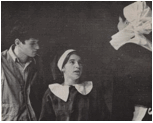
A 1970 Peg Board article described the “brilliant” work of the drama group, praising “Darrow’s playwrights, actors, directors, designers, carpenters, painters, lightingmen, prompters and many more,” and listing such sophisticated recent plays as Arsenic and Old Lace, Dial M for Murder, Circus of Sour, Antigone, Of Mice and Men, and The Crucible. The latter, Arthur Miller’s play about the Salem witch trials, shown in the photo, enlisted the talents of ten student actors from Miss Hall’s who joined the still all-male Darrow troupe. Having succeeded with one Miller play, the next semester they took on Death of A Salesman, with resounding success. A student wrote in the Peg Board of the intense, family-like feeling of the production company, of how Ron chose plays (and roles for individuals) that were challenging “but not over our heads,” and got them “to do unbelievable things with what we have,” and of the “incredible educational experience.”
It was also during this period that I started writing the Class of ’62 Newsletter. Ron didn’t respond very often to my requests for news, but word of him often arrived indirectly—from Richard, from the Sutherlands (who stopped in at Darrow), from Des McCracken. In 1968 I visited the school while I was home from California for Christmas, and found Ron, buried under a pile of final exams. By then he was head of the English Department, coordinating the curriculum, teaching several classes, running the drama program, and advising the Yearbook staff. In my newsletter notes I said “His hairline has receded (a little), his beltline has expanded (a little more).” Ron seemed quite happy, thriving on his work and life at Darrow.
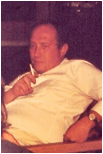 In the summer of 1970, when I was in grad school at Stanford, my then-wife, Alice, and I took a driving vacation back to the east coast, then westward across Canada en route back to California. Along the way we stopped at Darrow in late June, mostly to say goodbye to the Brodheads, who were departing that summer (see CDB memorial). But we also got a chance to visit briefly with the Jolines, the Nunleys, Des McCracken, and with Ron, with whom we stayed in his apartment in Ann Lee, where he was now the housemaster. Two years later, we made much the same trip, this time with Darrow and our 10th reunion as a primary destination. That June weekend a hurricane named Agnes came roaring up the coast and into the Hudson Valley, dumping foot of rain and forcing us indoors for most of the reunion. We enjoyed a private tour of Hancock Shaker Village, which Ron had graciously arranged. We spent most of the time in the lounge in the Dairy Barn, playing bridge, shooting pool, and chatting with Ron, shown in a photo I took then, John Joline, Des McCracken, Horton and Jean Durfee and others. (See photo album from the 10th reunion.)
In the summer of 1970, when I was in grad school at Stanford, my then-wife, Alice, and I took a driving vacation back to the east coast, then westward across Canada en route back to California. Along the way we stopped at Darrow in late June, mostly to say goodbye to the Brodheads, who were departing that summer (see CDB memorial). But we also got a chance to visit briefly with the Jolines, the Nunleys, Des McCracken, and with Ron, with whom we stayed in his apartment in Ann Lee, where he was now the housemaster. Two years later, we made much the same trip, this time with Darrow and our 10th reunion as a primary destination. That June weekend a hurricane named Agnes came roaring up the coast and into the Hudson Valley, dumping foot of rain and forcing us indoors for most of the reunion. We enjoyed a private tour of Hancock Shaker Village, which Ron had graciously arranged. We spent most of the time in the lounge in the Dairy Barn, playing bridge, shooting pool, and chatting with Ron, shown in a photo I took then, John Joline, Des McCracken, Horton and Jean Durfee and others. (See photo album from the 10th reunion.)
That was actually the second time I saw Ron in 1972; he had gone to San Francisco for spring vacation, stopped in to see Lester Henderson at the Athenian School, and the two of them drove down for dinner with Alice and me in our rented grad-student bungalow. Ron was thriving at the time—energized by his many school activities, and enthusiastic about coeducation, which Darrow had begun that academic year. When we saw Ron again at our 10th reunion, it seemed almost like an everyday encounter, I’d seen him so often lately. But as it turned out, that was the last time I’d ever see him.
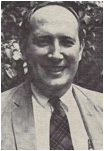 Peg Boards continued to arrive, and each issue seemed to carry news about Ron. The Spring 1973 issue featured this photo, in a long essay by John Joline, praising the diverse talents of the Darrow faculty. Ron, now in his 14th year at the school, “elicits superlative on superlative with every new drama production,” John wrote, adding that he had just produced “an adaptation of a number of Shakespearean scenes,” and that the whole show “…was brilliantly put together by director and actors alike in ten days this winter!” John also reported that Ron had spent the previous summer organizing the inventory, catalog publication and sale of Shaker artifacts from the North Family buildings, which the school had recently acquired. And as head of the English department, Ron had strengthened the teaching of writing and grammar skills, focused now on the first two years, while developing a wide selection of 10- to 12-week elective courses for upperclassmen.
Peg Boards continued to arrive, and each issue seemed to carry news about Ron. The Spring 1973 issue featured this photo, in a long essay by John Joline, praising the diverse talents of the Darrow faculty. Ron, now in his 14th year at the school, “elicits superlative on superlative with every new drama production,” John wrote, adding that he had just produced “an adaptation of a number of Shakespearean scenes,” and that the whole show “…was brilliantly put together by director and actors alike in ten days this winter!” John also reported that Ron had spent the previous summer organizing the inventory, catalog publication and sale of Shaker artifacts from the North Family buildings, which the school had recently acquired. And as head of the English department, Ron had strengthened the teaching of writing and grammar skills, focused now on the first two years, while developing a wide selection of 10- to 12-week elective courses for upperclassmen.
To all outward appearances, Ron was in his prime, but he was beginning to get restless. Would teaching at Darrow be his whole life? Could he afford to live on Darrow’s miserly salary for much longer? Ron needed to figure it all out, so he took an unpaid sabbatical for the 1974-75 school year. That April, I got a rare letter from Ron. He was writing a book about the Shakers, “a social history hung on chapter-biographies of about twenty important Shakers.” The enormity of the project had surprised him; he’d had to refresh his knowledge of various periods of history, and didn’t expect to finish by September. He was also working on The Outcasts, a musical based on Bret Harte’s “The Outcasts of Poker Flat;” some of his friends had written the music, Ron had written the book, and they were looking for a producer. Ron had begun his leave on Squirrel Island, ME, a writers’ colony and frequent retreat of his, then gone to England, where he stayed with a friend, Alicia Stroud, for five months. (Alicia, a long-time friend of Ron’s, is a noted artist and quite a world traveler herself.) Ron was headed next to Istanbul, then home to Saratoga in July, where he ran the family parking lot each summer during racing season. Ron would return to Darrow in September, although he said he had been hearing “ominous reports about the health of the school.” (Indeed, John Joline had announced his retirement as of the end of the school year, and the future must have seemed uncertain.)
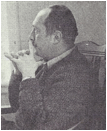
 The next we heard of Ron was a note in the Peg Board, with the left photo, commenting that his return from his sabbatical meant there was a fall play; this time, they’d put on a comedy, Harvey, about a giant talking rabbit. Later that year, Ron announced that he was leaving Darrow. The summer Peg Board carried a tribute to Ron by Des McCracken, with the photo at right. Des called Ron “A man for all hours,” praised his diversity of talents and contributions to school life, and “his humor, understanding, talent, intelligence and inspiration…He has never done anything half-heartedly. He had what the Boss called ‘enthusiasm for what is good’.”
The next we heard of Ron was a note in the Peg Board, with the left photo, commenting that his return from his sabbatical meant there was a fall play; this time, they’d put on a comedy, Harvey, about a giant talking rabbit. Later that year, Ron announced that he was leaving Darrow. The summer Peg Board carried a tribute to Ron by Des McCracken, with the photo at right. Des called Ron “A man for all hours,” praised his diversity of talents and contributions to school life, and “his humor, understanding, talent, intelligence and inspiration…He has never done anything half-heartedly. He had what the Boss called ‘enthusiasm for what is good’.”
When Ron left Darrow, he wasn’t sure where he was bound, just certain he needed a change. Don Beaver sent a note that summer, saying he had run into Ron at a harpsichord concert at Williams College, where Don was teaching. Ron looked for a position with a regional theater, or at one of the area’s Shaker museums, but none were to be found. In April 1977, he wrote to say he was preparing to leave for Jeddah, Saudi Arabia. One evening when Ron was visiting Richard Bethards in San Antonio, Richard, who was running the Defense Department’s ESL teaching program then, asked if Ron might like to try that. Before long, Ron had found a position teaching English to fighter pilots for Lockheed in Jeddah. He was excited to be going abroad again, said the job paid well, and hoped it was the beginning of a new direction in his career.
 The following March Ron wrote from Jeddah, “Leaving Darrow was a very smart move. It seems difficult to believe I stayed as long as I did. Corporate life is not so different from academia—both monstrously inefficient and wasteful. Am pretty much my own boss here. Heat is incredible.” He enclosed a page from the Arab News with what he called “a rave notice” of a Jeddah Players production he directed of A Streetcar Named Desire. Though they called him “Ron Emergy,” the review—which included this picture of Ron looking thinner, tan and vaguely Arabic—was extremely positive, and Ron said “It was every bit as good as the review says.” Here is an excerpt: “It is rewarding to see a really professional performance. In the past, the Jeddah Players have attempted to present workshop theater, often ending in timid gaucheness and self-conscious performances.” All they needed, it seems, was Ron!
The following March Ron wrote from Jeddah, “Leaving Darrow was a very smart move. It seems difficult to believe I stayed as long as I did. Corporate life is not so different from academia—both monstrously inefficient and wasteful. Am pretty much my own boss here. Heat is incredible.” He enclosed a page from the Arab News with what he called “a rave notice” of a Jeddah Players production he directed of A Streetcar Named Desire. Though they called him “Ron Emergy,” the review—which included this picture of Ron looking thinner, tan and vaguely Arabic—was extremely positive, and Ron said “It was every bit as good as the review says.” Here is an excerpt: “It is rewarding to see a really professional performance. In the past, the Jeddah Players have attempted to present workshop theater, often ending in timid gaucheness and self-conscious performances.” All they needed, it seems, was Ron!
Ron’s friend Larry Dudley, who will be formally introduced later in this narrative, shared a story about an adventure Ron had in Jeddah. A strict Muslim country, Saudi Arabia permitted neither sale nor consumption of alcoholic beverages, although the muttawa (the religious police) tended to tolerate use by foreigners as long as it was kept within their walled-off compounds. Ron and a friend had started a sideline business, bootlegging, and were making some serious money at it. One day he and his friend were driving somewhere with three jerry cans of bathtub gin in the car, when they were pulled over by the muttawa. The officer checked them out, spotted the cans, opened one, stuck his finger in and tasted the contents. Ron was terrified; people were publicly flogged (not just symbolically, but beaten severely) for moral offenses in Saudi Arabia. The cop carried a short leather-covered nightstick. He wagged it at Ron, then said, “Naughty, naughty,” and let them go. They were, after all, foreign infidels, from whom little was expected, so the police didn’t care about their transgressions.
While he was posted in Jeddah, Ron sent the photo at right—a fine company portrait. He headed back to the US in April 1978 after a year with Lockheed, stopping in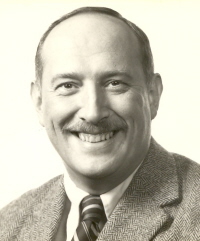 Turkey, Greece and England en route, arriving in Saratoga in time to park cars for the racing season. I spoke with him that autumn. He had hoped to work for Lockheed in China, but that didn’t work out. Once home, he had planned to spend a few months relaxing and looking for the right job, to start around the first of the new year, but that didn’t work out either. That summer Horton Durfee and his family were staying at their summer place in Geneva, NY, Dick and Sue Nunley were visiting, and they were having lunch with a friend, the chair of the English Department at Hobart. The chairman lamented the sudden departure, less than a month before the start of fall semester, of his drama instructor. Horton and Dick said, almost in unison, “We may have just the man you’re looking for….” Ron was hired within a week or so and when I spoke with him that fall, was teaching a survey course, rehearsing Equus with the student theater group, and enjoying interacting with a progressive, experimental theater group from Iowa that was in residence on campus that year. A few months later, the Peg Board quoted from the campus paper’s review of Equus, calling it “phenomenal…a landmark in the history of theatrical productions here at the colleges.” Ron was back in his element.
Turkey, Greece and England en route, arriving in Saratoga in time to park cars for the racing season. I spoke with him that autumn. He had hoped to work for Lockheed in China, but that didn’t work out. Once home, he had planned to spend a few months relaxing and looking for the right job, to start around the first of the new year, but that didn’t work out either. That summer Horton Durfee and his family were staying at their summer place in Geneva, NY, Dick and Sue Nunley were visiting, and they were having lunch with a friend, the chair of the English Department at Hobart. The chairman lamented the sudden departure, less than a month before the start of fall semester, of his drama instructor. Horton and Dick said, almost in unison, “We may have just the man you’re looking for….” Ron was hired within a week or so and when I spoke with him that fall, was teaching a survey course, rehearsing Equus with the student theater group, and enjoying interacting with a progressive, experimental theater group from Iowa that was in residence on campus that year. A few months later, the Peg Board quoted from the campus paper’s review of Equus, calling it “phenomenal…a landmark in the history of theatrical productions here at the colleges.” Ron was back in his element.
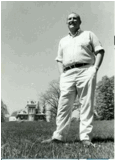 We didn’t hear directly from Ron for several years, but the Spring 1981 Peg Board reported that he was continuing his work as an English Professor and Director of Drama at Hobart. In 1983, the Peg Board noted that Ron had written music and ballet reviews for the Berkshire Eagle that summer. We learned later that his father had died, and he’d moved back to Saratoga to live with his mother, Elsa, leaving Hobart. And he had begun—at the Eagle, home of Dick Nunley’s columns, and at other area papers—what would become his ultimate career. The photo at left, from Larry, was taken in Saratoga around this time.
We didn’t hear directly from Ron for several years, but the Spring 1981 Peg Board reported that he was continuing his work as an English Professor and Director of Drama at Hobart. In 1983, the Peg Board noted that Ron had written music and ballet reviews for the Berkshire Eagle that summer. We learned later that his father had died, and he’d moved back to Saratoga to live with his mother, Elsa, leaving Hobart. And he had begun—at the Eagle, home of Dick Nunley’s columns, and at other area papers—what would become his ultimate career. The photo at left, from Larry, was taken in Saratoga around this time.
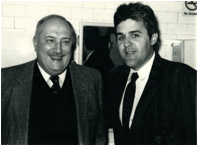 The next news came from the Summer 1987 Peg Board. Ron had been named the host of a new Sunday morning TV show, “About the Arts,” on WNYT, the Albany PBS station. The half-hour show, produced by Our Town TV in association with the Saratoga Performing Arts Center, premiered on June 14 and was slated initially for a 13-week run. Ron was described in the article as “a critic who most recently has been writing for the Schenectady Gazette.” His role as a TV host was to conduct “an in-depth interview with a star of dance, theater, music or literature.” The photo at right, also from Larry, shows Ron with one of his TV guests—a comedian who probably never amounted to much.
The next news came from the Summer 1987 Peg Board. Ron had been named the host of a new Sunday morning TV show, “About the Arts,” on WNYT, the Albany PBS station. The half-hour show, produced by Our Town TV in association with the Saratoga Performing Arts Center, premiered on June 14 and was slated initially for a 13-week run. Ron was described in the article as “a critic who most recently has been writing for the Schenectady Gazette.” His role as a TV host was to conduct “an in-depth interview with a star of dance, theater, music or literature.” The photo at right, also from Larry, shows Ron with one of his TV guests—a comedian who probably never amounted to much.
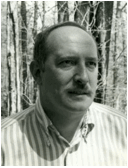 Larry filled in some details of Ron’s career during this period. Ron started out writing reviews for the Saratogian, was there for a year or two, then was was hired away by the Schenectady Gazette. A few years after that, the Albany Times Union hired him away from the Gazette. Each step was to a bigger paper with greater circulation and a higher salary. Larry succeeded Ron at the Saratogian; they met through covering the same events. Larry says the pay was terrible, but you got in for free, and the arts centers would seat critics together in the best seats. They became friends and often carpooled to events. They had plenty to cover. Ron’s “beat” ran from Music Mountain in CT to the Bard Festival, to Lake Placid, to Glimmerglass in Cooperstown, to Jacob’s Pillow and Tanglewood. They kept him busy and he traveled a lot. Larry recalls what a brilliant and engaging mind Ron had. “We went to Glimmerglass once to see Rigoletto. It was just god-awful, a train wreck in so many ways, and we spent the entire two- and-a-half-hour ride home furiously talking and picking it apart.” Larry adds, “I have never had anyone to talk to like that since, and deeply miss him. What an amazing man he was!”
Larry filled in some details of Ron’s career during this period. Ron started out writing reviews for the Saratogian, was there for a year or two, then was was hired away by the Schenectady Gazette. A few years after that, the Albany Times Union hired him away from the Gazette. Each step was to a bigger paper with greater circulation and a higher salary. Larry succeeded Ron at the Saratogian; they met through covering the same events. Larry says the pay was terrible, but you got in for free, and the arts centers would seat critics together in the best seats. They became friends and often carpooled to events. They had plenty to cover. Ron’s “beat” ran from Music Mountain in CT to the Bard Festival, to Lake Placid, to Glimmerglass in Cooperstown, to Jacob’s Pillow and Tanglewood. They kept him busy and he traveled a lot. Larry recalls what a brilliant and engaging mind Ron had. “We went to Glimmerglass once to see Rigoletto. It was just god-awful, a train wreck in so many ways, and we spent the entire two- and-a-half-hour ride home furiously talking and picking it apart.” Larry adds, “I have never had anyone to talk to like that since, and deeply miss him. What an amazing man he was!”
In 1987, the year of our 25th reunion, the Winter Meeting Room in Wickersham, the school library and study hall in our day, was renovated with a gift from our class and rededicated as the Richard L. Bethards Meeting Room, to honor Richard, who had died that spring. The school held a dedication ceremony that fall; I don’t think Ron made it to the ceremony, but he was quoted there: “Ron recalls Richard often coming into this room for study hall and saying, ‘Why does it look like this?’ “ The Peg Board writer went on, “Today, Darrow can answer that question! It looks like this because of the effort and generosity of the Class of 1962.”
The Summer 1988 Peg Board reported that Ron was now the Music and Dance Editor at the Times-Union. His successful TV show was in its second season. He was by then a well known and highly respected critic of music, dance and theater in the Capital Region; many of his reviews can still be found on the internet, on the web sites of various publications for which he wrote (see the Links page or do your own Google search.)
I stopped writing the class newsletter around 1982, and with that, stopped contacting everyone every year or so; my efforts focused instead on organizing our major reunions every five years. I knew Ron was living in Saratoga and was working as a music and drama critic, but I essentially lost touch with him. I tried calling him several times to invite him to reunions, but usually we didn’t connect. In 1994, the Peg Board quoted from a letter written to the Times Union, praising Ron’s music reviews. After a while, it seemed, as Ron’s friends retired or left Darrow, Ron had drifted out of touch with the school, and he stopped sending regular news to the Peg Board; I found no mention of him there after 1994.
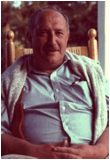 From what little news we did hear of Ron during this period, his life had settled into a comfortable routine. He was living at home, caring for his mother, and working as one of the preeminent critics in the Albany area. He covered numerous local performing arts centers already mentioned and area festivals like the Lake George Opera and the Luzerne Music festival. His interviewees for About The Arts included Beverly Sills, Dave Brubeck, actress Michael Learned and many other luminaries. As this photo and one below, also from Larry Dudley, both taken at Squirrel Island suggest, Ron grew steadily more Falstaffian, at least outwardly, as the years passed.
From what little news we did hear of Ron during this period, his life had settled into a comfortable routine. He was living at home, caring for his mother, and working as one of the preeminent critics in the Albany area. He covered numerous local performing arts centers already mentioned and area festivals like the Lake George Opera and the Luzerne Music festival. His interviewees for About The Arts included Beverly Sills, Dave Brubeck, actress Michael Learned and many other luminaries. As this photo and one below, also from Larry Dudley, both taken at Squirrel Island suggest, Ron grew steadily more Falstaffian, at least outwardly, as the years passed.
Ron’s final life chapter was, sadly, a protracted saga of declining physical health, tinged with tragedy. Around the time he moved back to Saratoga, Ron developed diabetes. He elected to manage it himself by injecting insulin, but Larry reports that he could not or would not take care of himself properly, nor could his mother, and so his condition progressively worsened. One wintry day in 1990 or so, Ron slipped on the ice outside a store in Saratoga and fell. While he was in surgery for a leg injury, the anesthesia was badly administered. He woke up on the operating table, and in trying to put him back under they panicked and overdosed him; his heart and breathing stopped. They resuscitated him with the “crash cart” and put him on a respirator, but the air tube was too small, and he was oxygen-deprived for a couple of days. Ron suffered brain damage that, according to Dick Nunley, Larry Dudley and others who knew him, changed his personality. He lost, at least intermittently, parts of his long-term memory, and as a consequence his years at Darrow were effectively erased much of the time. As Dick put it, “He grew more and more incommunicative and ceased to respond to anyone from his Darrow days.” Larry says that Ron was so bright that he could compensate for some of the damage, and at times he might seem almost like his old self, but he wasn’t. For instance, he had stopped reading. He did go back to reviewing, but “he was never the same.” Ron sued the hospital for malpractice, and they settled out of court.
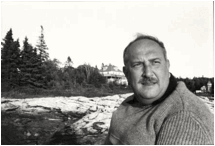 The last time I spoke with Ron was in 2007, as we were preparing for our 45th reunion (I hoped he might be able to attend, perhaps with a ride from one of our returning classmates.) He was gracious, but seemed to have no idea who I was, said he was unable to travel, and our conversation was brief.
The last time I spoke with Ron was in 2007, as we were preparing for our 45th reunion (I hoped he might be able to attend, perhaps with a ride from one of our returning classmates.) He was gracious, but seemed to have no idea who I was, said he was unable to travel, and our conversation was brief.
Ron also had a couple of major strokes, Larry says, but his most serious health problem was his mismanaged diabetes. Ron declined physically and cognitively, and could no longer take care of his mother or himself. His mother was also getting too old to care for either of them. Eventually, it was time to find another living situation, and Elsa (and a friend who had her health-care proxy) found the Eastern Star nursing home, in Oriskany, NY, west of Utica. Elsa was a lifelong member of the Order of the Eastern Star, a fraternal organization similar to the Masons; in fact, she was an Exalted Grand Matron, Larry says, quite a big deal, so she had a natural affinity for a home operated by the Order. Elsa was admitted first, and as it quickly became clear he could not care for himself, Ron joined her there a few months later. While it was a good facility and they were well taken care of, their home had to be sold and their other assets liquidated to pay for it, and it was distant enough from Saratoga that they lost touch with almost all of their friends.
Laurel Trahan, who had been a school nurse at Darrow in 1976, Ron’s last year there, and had stayed in close touch with him, contacted me in 2007 after the Peg Board listed Ron as one of the “lost” people our class was hoping to find for our 45th. It was Laurel who told us that Ron and Elsa were living at Eastern Star, and also put me in touch with Larry Dudley. What news we had of Ron in recent years came mostly through Laurel and Larry.
We had hopes for a while that Howdy Davis, our lone classmate in western New York, might be able to visit Ron, but that didn’t work out. Ron did not wish to see visitors. After my call, when Ron didn’t seem to remember me, Peter Golden called Ron, “caught him on a good day,” and they had a lengthy conversation, in which Peter honored Ron for his positive influence on our lives. Peter said that, when he raised the topic of attending our reunion, Ron declined again, and “in an understated, kindly and mannerly way,” he had indicated quite clearly that he’d rather we leave him alone. Peter said Ron spoke with clarity of the many stages his career had gone through, and that it appeared they shared “tastes, values and experiences that are remarkably similar.” Pete felt Ron “has his pride and values his privacy,” but wrote that while Ron “still has a vital interior life,” he had good days and bad days. As Pete put it, “This is one highly refined guy, it is his spirit that counts, not his physicality, and he knows how to soar, even with some of the engines out.”
From that point, we followed Ron’s wishes and left him to his own pursuits. Laurel reported that she’d visited with him in August of 2007, and found him looking well, getting around in a wheelchair, in good spirits; she said the home was not spacious but had a “warm and cozy” feel and she thought he was being well cared for. Ron and his mother had rooms next to each other; Laurel described Elsa as a very sweet lady, and said she and Ron were very close. When she visited, Ron was pretty much the man she knew, with a good sense of humor, and Laurel said he seemed much better than he’d been the last time she’d seen him, in Saratoga, before he entered Eastern Star. She said he mentioned that he’d been called about a Darrow reunion and seemed thrilled about that, that our efforts had meant a lot to him.
In 2008, Laurel passed on word from Larry that Ron’s mother had passed away, at the age of 98. Larry had seen them a week or two before her death, and found Ron very lucid; he also said Ron was with his mother when she died. Larry reported that Ron watched a lot of TV, seemed aware of the news and “everything going on.”
Finally, word came this July that Ron had died, “after a long illness,” on June 28 this year. He was 77. Laurel sent around an obituary, written by Larry and published in the Times Union. I learned several things from reading it that I’d never known about Ron: He spent a year in France as an AFS scholar in 1951; he was the valedictorian of the Saratoga HS class of 1952; he had known James Baldwin, who was part of the expatriate American literary community in Istanbul in the 1950s; and his fighter-pilot English students when he worked for Lockheed in Jeddah were Saudi princes, which led to Ron’s regularly hobnobbing and enjoying sumptuous Arab feasts with the Saudi Royal Family.
Ron never married; unlike his friend and mentor Richard, no love-of-his-life entered the picture in his mature years. He did have several deep friendships, with women and with men, but Ron kept his private life private. He had no children, but he had an extensive support network of friends, colleagues, classmates and former students. Ron found a great deal of joy in life, and in its “finer things.” He loved music, literature, dance, theater, the arts, and spent most of his life working at what he loved. He was a wonderful teacher, inspiring the same love of great cultural works in others that he felt himself. He was an insightful critic, who could not only judge quality in the arts, but also make us see why the arts mattered. He greatly enjoyed fine food and drink, and was a gourmet cook whose dinner invitations were highly prized. He enthusiastically embraced the opportunities to live and work abroad that presented themselves several times in his life. He shared his joys generously with those around him, his students, and (through his media work), even with total strangers. Des McCracken spoke of Ron’s “joie de vivre,” and as Peter said so well, Ron “knew how to soar.” As sad as we are that he has departed, we celebrate the many ways he enriched our lives.
To view In Memoriam: Ron Emery, by Larry Dudley, click here.
Home | Class News | 50th Reunion | Past Reunions | Other Gatherings | Newsletter Archive | Links | Memorials | Classmates Search | Classmates Found | Former Faculty | Contacts |